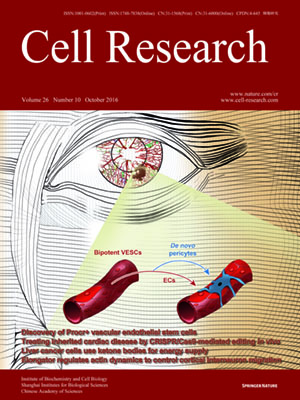
Volume 26, No 10, Oct 2016
ISSN: 1001-0602
EISSN: 1748-7838 2018
impact factor 17.848*
(Clarivate Analytics, 2019)
Volume 26 Issue 10, October 2016: 1077-1078
RESEARCH HIGHLIGHTS
Aberrant ketolysis fuels hepatocellular cancer progression
Lorenzo Galluzzi1,2,3,4,5,6 and Guido Kroemer2,3,4,5,7,8,9
1Department of Radiation Oncology, Weill Cornell Medical College, New York, NY 10065, USA
2Equipe 11 labellisée Ligue contre le Cancer, Centre de Recherche des Cordeliers, 75006 Paris, France
3INSERM, U1138, 75006 Paris, France
4Université Paris Descartes/Paris V, Sorbonne Paris Cité, 75006 Paris, France
5Université Pierre et Marie Curie/Paris VI, 75006 Paris, France
6Gustave Roussy Comprehensive Cancer Institute, 94805 Villejuif, France
7Metabolomics and Cell Biology Platforms, Gustave Roussy Comprehensive Cancer Institute, 94805 Villejuif, France
8Pôle de Biologie, Hopitâl Européen George Pompidou, AP-HP, 75015 Paris, France
9Department of Women's and Children's Health, Karolinska University Hospital, 17176 Stockholm, Sweden
Correspondence: Lorenzo Galluzzi, E-mail: deadoc@vodafone.it; Guido Kroemer,(kroemer@orange.fr)
At odds with their normal counterparts, hepatocellular carcinoma cells efficiently utilize ketone bodies to proliferate despite serum deprivation. These findings, which have been recently published in Cell Research, identify a novel metabolic circuitry through which tumors successfully cope with adverse microenvironmental conditions.
10.1038/cr.2016.110
FULL TEXT | PDF
Browse 1866


